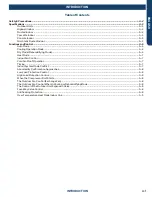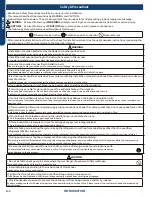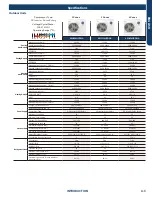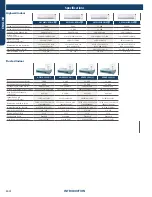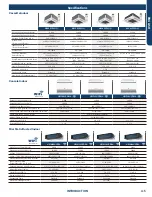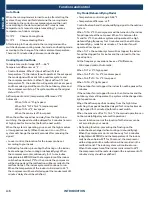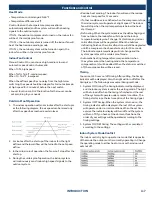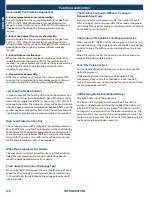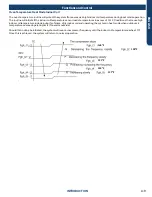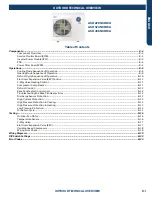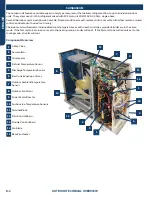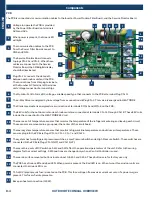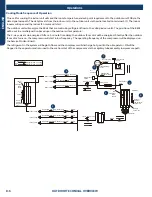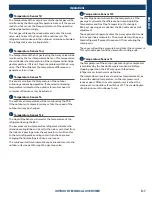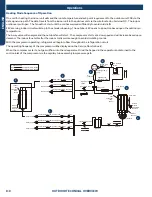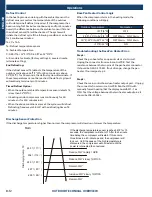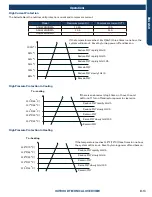
INTRODUCTION
ENGLISH
A-8
Functions and Control
Abnormality Confirmation Approaches
1. Indoor temperature sensor abnormality:
Under the operation, the normal temperature ranges from
120°F to -30°F. When the temperature goes beyond this
range, the abnormality can be confirmed. If the temperature
goes back into the range, the system will automatically
resume.
2. Indoor heat interaction sensor abnormality:
Under the operation, the normal temperature ranges from
120°F to -30°F. When the temperature goes beyond this
range, the abnormality can be confirmed. If the temperature
goes back into the range, the system will automatically
resume.
3. Indoor/Outdoor malfunction:
When the indoor system receives the outdoor malfunction
codes, it will store the code into E2 for the malfunction list
resume. The indoor system will continue to operate according
to the original status, the malfunction code will not be
revealed or processed.
4. Transmission abnormality:
If the indoor system can’t receive the outdoor system for 8
minutes, the communication abnormality can be confirmed
and reported and the outdoor system will be stopped.
Low Load Protection Control
In order to prevent the frosting of the indoor heat interaction
device, the outdoor system will be stopped if the indoor heat
interaction temperature is 32°F for 5 minutes, but the fan will
continue to operate. The outdoor system will be started again
when the heat interaction temperature is above 108°F, and the
system has been stopped for 3 minutes. The malfunction will
be stored in the malfunction resume and will not be revealed.
High Load Protection Control
The outdoor system will be stopped if the coil temperature is
above 149°F for 2 minutes. The indoor fan will be controlled by
the thermostat. The outdoor system can be restarted when
the coil temperature is below 108°F and the system has been
stopped for 3 minutes. The malfunction will be stored in the
malfunction resume and will not be revealed.
When the Compressor First Starts
The compressor will start in low frequency. After a brief time
delay, the compressor will come up to operating speed to
meet the demand requirement for capacity.
The Outdoor Fan Control (Exchange Fan)
When adjusting the fan speed, the unit should remain at each
speed for 30+ seconds to avoid speed-change malfunctions.
In Cooling Mode, the wait time between speed levels should
be 15 seconds.
The Outdoor Fan Control When In Cooling or
Dehumidifying Mode
Five seconds after compressor starts, the outdoor fan will
start running at medium speed. After 30 seconds, it begins to
control the fans peed according to the temperature conditions
of the outdoor environment.
The Control of the Outdoor Unit Expansion Valve
When unit starts, the EEV valves will energize and change to a
standard opening. When operation starts, the EEV will change
position to keep the suction vapor superheat level at around
10°F.
When the unit is shut off the opening size of the expansion
valve of the indoor unit is 5 steps;
Four-Way Valve Control
For the details of defrosting four-way valve control, see the
defrosting process.
Under heating mode, the four-way valve opens. If the
compressor does not start or changes to a non-heating
mode, the compressor will be stopped for 2 minutes, and then
the four-way valve will shift.
Antifreezing Protection (Highwall Only)
Prevents freeze-up of the indoor coil
The indoor unit coil temperature sensor will shut off the
outdoor unit and begin a defrosting routine if the indoor coil
is below 32°F for more than 2 minutes. The indoor unit will
not report this operation. Once the indoor coil warms up, the
system will re-enter cooling mode and operate normally, This
protection cycle prevents the indoor coil from developing ice
coating during low heat load operation.
Summary of Contents for AB09SC2VHA
Page 2: ...Oct 2020 Manual release Revision History ...
Page 12: ... This page intentionally left blank ...
Page 45: ...WALL MOUNT TECHNICAL OVERVIEW ENGLISH Topic Title C 9 Wiring Diagrams ...
Page 68: ... This page intentionally left blank ...
Page 78: ... This page intentionally left blank ...



